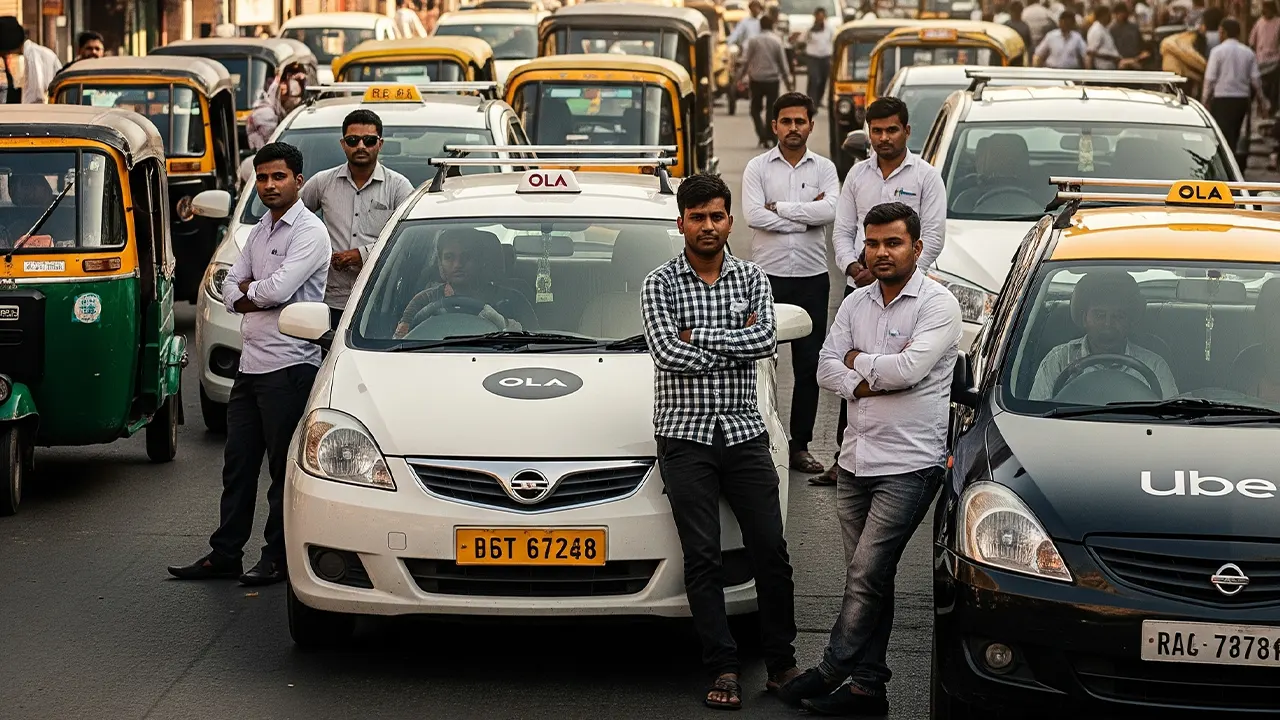Ola-Uber Strike in Mumbai: The Crisis Fueling Sahkar Taxi’s Growth
For the third consecutive day, Mumbai’s roads have felt the heat not from traffic, but from silence. Hundreds of Ola, Uber, and Rapido drivers have stayed off the streets, intensifying an indefinite strike that has crippled transport across key areas like the airport, Bandra-Kurla Complex, Andheri, and South Mumbai.
Behind this protest lies a deep-rooted frustration. Drivers say their take-home income has plummeted to unsustainable levels sometimes as low as ₹8 to ₹12 per kilometre after deductions. The reasons are familiar: high platform commissions, unchecked aggregator control, and a glaring absence of regulatory enforcement. Their key demands include fair per-kilometre fares in line with local black-and-yellow taxis (₹18/km), capped commission rates, and implementation of the long-delayed Maharashtra Aggregator Policy.
Organised by the Maharashtra Rajya Rashtriya Kamgar Sangh and the Indian Gig Workers Front, drivers have clearly stated they won’t return to the roads until the state offers concrete, written assurances. While early talks with the transport department have taken place, no firm action has been taken yet.
Why Sahkar Taxi Is Changing the Game?
Amid this chaos, one name is quietly but powerfully emerging: Sahkar Taxi.
Built by people who understand what Indian drivers and passengers both need, Sahkar isn’t just another app. It’s a service that listens. Where other platforms take up to 30% commission from each ride, Sahkar caps its commission significantly lower allowing drivers to actually earn with dignity. For passengers, it means better service, stable pricing, and a ride experience that feels local, not corporate.
Unlike the major aggregators, Sahkar Taxi doesn’t treat drivers like gig workers it treats them like partners. The model is simple: low commission, transparent pricing, and real-time support. Drivers get paid fairly, passengers get served reliably. That balance is what the bigger platforms failed to maintain and it’s exactly why they’re now looking over their shoulders.
Sahkar Taxi is already operational in multiple cities and expanding fast. With every new signup, it’s proving that fairer systems aren’t just possible they’re scalable. In cities like Mumbai, where drivers are desperate for change and passengers are tired of cancellations and surges, Sahkar is setting a new standard.
Why Ola and Uber Should Be Worried
The current strike is not just about pay. It’s about broken trust. And where trust breaks, people look for better options.
Sahkar Taxi is filling that vacuum. It’s designed with Indian roads, Indian fares, and Indian values in mind. Drivers are joining not just for the better income but for respect. Passengers are switching because they want predictability without being manipulated by surge pricing.
If this strike continues and signs say it will Sahkar’s presence will only grow stronger. And once people get used to a service that works for them instead of against them, there’s no going back.
The road ahead is changing. Not just for Mumbai, but for the way India moves. And it’s clear: Sahkar Taxi isn’t just another app. It’s the beginning of a much-needed shift one that gives power back to the people behind the wheel and those sitting beside them.

